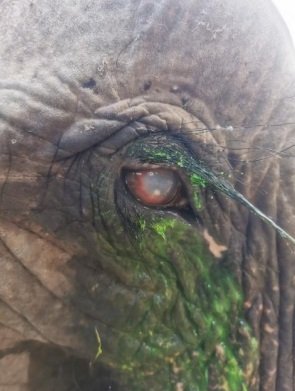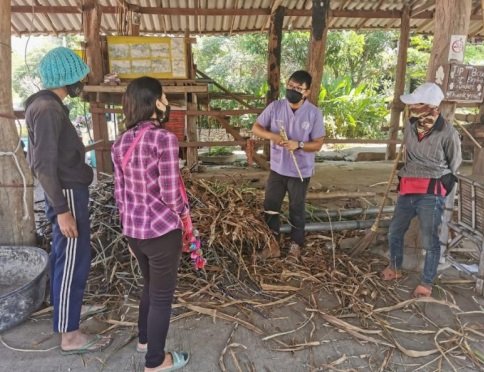The Chiang Mai University Mobile Vet Clinic was busy yet again at the close of 2021. The first few days of December were spent in the Mae Wang and Mae La Noi areas of Thailand. On December 2, in Mae Wang, the veterinary team rushed to an elephant with an eye injury. It was reported that the elephant’s eye was very teary, so the veterinarians provided medication for the injury. The next day the owner decided to take the elephant to the Elephant Hospital in Lampeng for further treatment.
Dr. Siripat providing medication to mahout
While in Mae La Noi on December 2-3, the veterinary team followed up by doing a health check on an elephant that they first saw back in June 2021. The elephant was looking good and staying healthy, but the veterinarians still gave the owners some first aid and medicine for the elephant. After leaving Mae La Noi the CMU PhD students traveled to an elephant sanctuary on December 7 in Loie to continue to collect fecal samples for their research studies.
The next day, the team traveled to Mae Chaem district to treat an elephant reported to have diarrhea.
Upon arrival, the elephant was found to not be eating or drinking. The veterinarian decided to treat with activated charcoal, and spent the night with the elephant to make sure she was feeling better before returning to Chiang Mai. The following day, the elephant was indeed looking better.
December 14 saw the veterinarians traveling to Pai area, to follow up on some elephants that had been seen last month and we reported on in our January Newsletter. The elephant with the abscess on his back is still not ready for the abscess to be opened and cleaned, so the doctors and staff will continue to monitor this elephant. The elephant with the eye injury from bamboo to the eye is doing very well. The eye healed almost normally, although with a scar on the eye. However there is 90% vision in the elephant’s eye which is a great accomplishment for the veterinary assistant who took care of this elephant. Thirdly, the elephant with sores on his genitals was also healing well with treatments provided by his mahout, and the sores left no scars. The vets also took the time to educate the elephant owners on food quality for their elephants.
In the winter months, the quality and quantity of food for the elephants is diminished, and the colder weather causes the elephants to drink less water. So the vets took this opportunity to advise the owners of proper food management. Their philosophy is prevention is more important than treatment.
On December 17, the vet team provided laser therapy for an elephant in the Mae Tang area. This is the first time the veterinarians have used laser therapy so this is an exciting moment for them! The large male elephant on which they performed the laser therapy was suffering from a musculoskeletal issue. The team expects the tusker to be fine after the treatment, however the vets and the elephant camp will closely monitor the results. A few days later, the elephant had an abscess that was opened up by the elephant camp caretakers, so the veterinarians used laser treatment again to facilitate the healing process.
The team finished up the year in Mae Tang with yet another laser treatment session, this time for an older female who couldn’t stand up on her own. After watching the elephant walk, the veterinarians decided to perform the laser therapy on the elephant’s hip and knee areas. The camp managers and the vet team will collaborate to monitor her progress and evaluate the need for further treatments.
The CMU Mobile Vet Clinic ended their year busier than ever! To support their efforts into the New Year, please visit our website at www.asianelephantsupport.org to donate and help our veterinary partners.
Mae Chaem calf with diarrhea back with her herd the following day after receiving care from the CMU Mobile Vet Clinic







